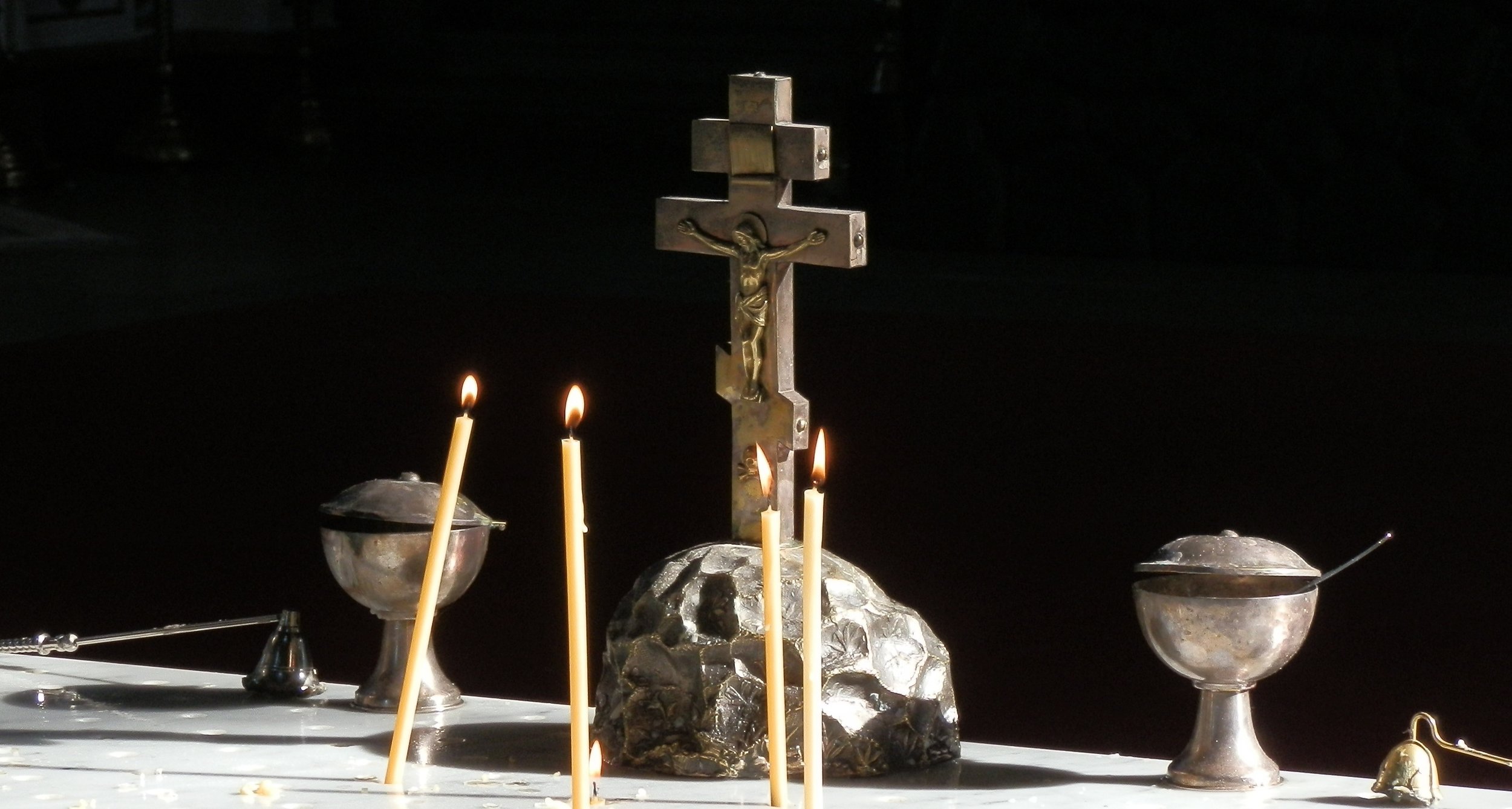Healing Atonement
Athanasius of Alexandria (c.298 - 373 AD)
An old clay oil lamp from Nazareth, Israel. Photo credit: Olivia Armstrong.
Athanasius of Alexandria (c.298 - 373 AD) is considered the fountainhead of all Christian theology. He defended the full divinity of Jesus and the Nicene Creed concerning the Trinity at a time when the Roman Emperor and some church leaders were opposed and hostile. He also was the first to describe the New Testament as the collection of 27 books we receive today.
Blog Posts on Athanasius of Alexandria
Athanasius as Evangelist: Ways the Early Church Differed from the Protestant Reformers (Nov 1, 2017)
Discusses human development, body and soul.
Athanasius as Evangelist: Is God Good Despite Evil? (Nov 3, 2017)
Examines Creation and Fall through an understanding of God's Triune nature of love and goodness.
Athanasius as Evangelist: Why Human Evil is Even Possible, and Why Sin is Addictive (Nov 11, 2017)
Discusses human nature, synthesizing many biblical passages starting from Genesis 3 - 4.
Athanasius as Evangelist: Why Sin is Terrifying, and God Is Not (Nov 19, 2017)
Where I examine Hebrews 10:26 - 31 (it is a terrifying thing to fall into the hands of the living God) and Matthew 10:28/Luke 12:4 - 5 (fear the one who can destroy the soul) and compare them to Athanasius' insights.
Athanasius as Evangelist: Where Penal Substitution Goes Wrong, and Medical Substitution Succeeds (Nov 23, 2017)
Touches on the logic of unlimited atonement in an ontological-medical paradigm, not a legal-penal one.
Athanasius as Evangelist: Jesus Paid the Debt to God, and Helps You Pay the Debt You Still Owe to God, Too (Dec 21, 2017)
A thorough examination of debt in both Old and New Testaments, and what debt-forgiveness means in various passages in relation to atonement and salvation; includes a thematic treatment of human nature.
Athanasius as Interpreter of the Trinity: Why the Nicene Creed and Penal Substitution are Incompatible (Jan 9, 2018)
An introduction to the Father-Son relation, drawing from 1 Corinthians 1 and John 5.
Athanasius as Interpreter of the Trinity: Why the Nicene Creed and Penal Substitution are Incompatible, Part Two (Jan 21, 2018)
Further examines the Son as the Father's wisdom and power, including Colossians 1:15 - 17.
Athanasius as Evangelist: God Haunts and Calls Us Through Our Own Words (Jan 22, 2018)
Discusses Genesis 1 and 2 and the function of language as first originating with God, and secondarily developed by humans.
Messages and Essays on Athanasius of Alexandria
The Goodness of God and the Healing of Creation According to Athanasius of Alexandria
Slides to a presentation given to the 2022 Reconstruction class. It spotlights Athanasius’ teaching on the following topics: creation; corruption; clinical trial in Israel; cure in Jesus; consummation. This is a good introduction to the broad thought of the early Christians, since Athanasius is considered a faithful spokesman. It also pays special attention to penal vs. medical substitutionary atonement, which introduces us to the contrast between divine retributive vs. restorative justice.
Slides of a presentation given October 30, 2021 to the Reconstruction class. This presentation covers the conceptual and linguistic factors that led to the need to explain the Father-Son relation at the Council of Nicaea, the anti-Nicene reaction, Athanasius’ leadership advocating a pro-Nicene position, and the articulation of the Constantinopolitan revision of the Creed in 381 AD. Note that medical substitutionary atonement serves as the foundation of Trinitarian theology on slides 15 - 17, 21, 24, 31.
Slides of a presentation given November 2022 to the Reconstruction class. This presentation covers the first century disagreement between Christian sexual ethics and Hellenistic sexual ethics, especially Stoicism. The first part is an introduction to patristic statements about God’s vision for sex and marriage. The second part is called The Diverse Community: Athanasius' Letter 48 to Amun and Festal Letter 10, which is about how Athanasius as a pastoral bishop brought together married, single, and committed celibates. The third section is called The Value of Struggle: Athanasius' Life of Anthony. It explores the story of the desert monastic Christian named Anthony, and the role of his sexual struggles and commitment to celibacy.
Medical Substitutionary Atonement in Athanasius of Alexandria
An introduction to Athanasius of Alexandria and his theology of atonement.
Penal Substitution vs. Medical Substitution: A Historical Comparison
An analysis of the atonement theology ("medical substitution") of early church theologians, including Ignatius of Antioch, Irenaeus of Lyons, the Odes of Solomon, Justin Martyr of Rome, Melito of Sardis, Tertullian of Carthage, Methodius of Olympus, Athanasius of Alexandria (paper in progress to include later theologians, bishops, and councils)
The Good God and the Healing of Creation According to Athanasius of Alexandria
Slides to a presentation given Feb 4, 2019 to my class in Orthodox Dogmatics at Holy Cross Greek Orthodox Seminary, at the kind invitation of Father Emmanuel Clapsis.
Athanasius as Evangelist, Part 1: Against the Heathen / Contra Gentes (c.328 AD)
An essay for Father George Dion. Dragas, at Holy Cross Greek Orthodox Seminary, Fall Semester 2017; examines Athanasius' first work in its evangelistic appeal, atonement theology, and Trinitarian framework, in comparison with penal substitutionary theory
Athanasius as Evangelist, Part 2: On the Incarnation / De Incarnatione (c.328 AD)
An essay for Father George Dion. Dragas, at Holy Cross Greek Orthodox Seminary, Fall Semester 2017; examines Athanasius' second work in its evangelistic appeal, atonement theology, and Trinitarian framework, in comparison with penal substitutionary theory; considers the questions of the human soul of Christ and the fallen human nature of the incarnation
Athanasius as Interpreter of the Trinity, Part 1: Discourses Against the Arians 1 - 2 / Contra Arianos 1 - 2 (c.341 - 2 AD)
An essay for Father George Dion. Dragas, at Holy Cross Greek Orthodox Seminary, Fall Semester 2017; examines Athanasius' major dogmatic work on the Father-Son relation, compared with penal substitutionary theory and Lutheran-Reformed doctrine of justification
Athanasius as Interpreter of the Trinity, Part 2: Discourse Against the Arians 1 - 2 / Contra Arianos 1 - 2 (c.341 - 2 AD)
An essay for Father George Dion. Dragas, at Holy Cross Greek Orthodox Seminary, Fall Semester 2017; examines Athanasius' major dogmatic work on the atonement in its various dimensions
Athanasius as Interpreter of Jesus' Humanity: Discourses Against the Arians 3 / Contra Arianos 3 (c.345 AD)
An essay for Father George Dion. Dragas, at Holy Cross Greek Orthodox Seminary, Fall Semester 2017; examines Athanasius' major dogmatic work on the topic of Jesus' humanity. Here I believe we start to see the “Hellenistic” influence of treating the Son’s divine nature as a static category on the topic of “divine emotions” (vs. “immutability”) and “divine ignorance” (vs. “omniscience”), and departing from the biblical portrayal of God responding to us emotionally and knowing us more dynamically, committed to time out of His love for us. This impacted how Athanasius conceived of Jesus’ human emotions and knowing. Athanasius compares unfavorably with Irenaeus of Lyons on these points, in my opinion.
Athanasius as Theologian of the Holy Spirit: Letters to Serapion on the Holy Spirit / Ad Serapionem (c.359 - 60 AD)
An essay for Father George Dion. Dragas, at Holy Cross Greek Orthodox Seminary, Fall Semester 2017; examines Athanasius' major dogmatic works on the Holy Spirit.
Athanasius as Theologian of Sanctification: Life of Antony / Vita Antonii (c.362 AD)
An essay for Father George Dion. Dragas, at Holy Cross Greek Orthodox Seminary, Fall Semester 2017; examines Athanasius' very influential biography of the Egyptian monk Antony of the Desert; this established Christian monasticism and shows Athanasius at his pastoral best. I critique Karl Barth and T.F. Torrance (and the Lutherans and Reformed theologians they represent) for placing “justification” as theologically and pastorally prior to “sanctification.” Athanasius’ work and various biblical texts on sanctification demonstrate that this “ordo salutis” is erroneous, and the result of a dim view of human nature - namely, the Augustinian view of total depravity imbibed by Luther and Calvin.
Athanasius on the Holy Spirit, Conversion, and Sanctification, Part 1
A long essay surveying Athanasius' framework and rhetoric for understanding the Holy Spirit's work.
Athanasius on the Holy Spirit, Conversion, and Sanctification, Part 2
A long essay surveying Athanasius' framework and rhetoric for understanding the Holy Spirit's work (paper in progress)
Fallen or Unfallen: Studies in Athanasius’ Contra Apollinarium and the Humanity of Jesus (c.373 AD)
An essay arguing that Athanasius (or someone writing under his name and tradition) demonstrated a commitment to the “fallenness” camp, although he used Apollinaris’ terms. Here is the text of Athanasius of Alexandria, Contra Apollinarium.
Discussions About Athanasius of Alexandria
Debate on Facebook with RR, LF, ED about God’s Triune Nature and Compatibility with Restorative Justice Over Retributive Justice (Facebook, Dec 25, 2020) a sprawling discussion that started with a quote by Athanasius, explores God’s activities in both the Old Testament and in Christ, shows the importance of including “human nature” in the atonement and not just “human personhood,” and “human desires” in salvation and not just “human deeds.”
The Writings of Athanasius of Alexandria
Athanasius of Alexandria, On the Incarnation, chapters 2 - 10
Athanasius of Alexandria, Discourses Against the Arians, discourse 1, paragraphs 51 and 60
Athanasius of Alexandria, Discourses Against the Arians, discourse 3, paragraphs 31, 33, 39
Athanasius of Alexandria, Letter 3, paragraphs 3 - 4 note the motif of God as a purifying fire, not a retributive fire
Athanasius of Alexandria, Letter 11, paragraph 14
Athanasius of Alexandria, Letter 59 to Epictetus of Corinth, paragraph 8 sees John 1:14 and Galatians 3:13 as mutually interpreting
Athanasius of Alexandria, Letter 60 to Adelphius, paragraph 4 sees 2 Peter 1:4 and Romans 8:3 as mutually interpreting
Athanasius of Alexandria, Letter 61 to Maximus, paragraphs 2 - 3 for discussion of Jesus' genuine humanity, and our reception of him being deification
Athanasius of Alexandria, Tomus ad Antiochenos 7 for Jesus having a human soul; cf. Against Apollinaris 1.17 "he gave body for body and soul for soul" and see Matthew Craig Steenberg, Of God and Man: Theology as Anthropology from Irenaeus to Athanasius (Amazon book, 2009, ch.5) for more discussion
Athanasius of Alexandria, Letters to Serapion on the Holy Spirit 2.7 - 8 (translation and commentary by C.R.B. Shapland, pdf file) full text now online here
Athanasius of Alexandria, Life of Antony paragraphs 7 and 74 where the monk Antony participates in what Jesus did in his own human nature: he condemned sin in his own flesh
Athanasius of Alexandria, Life of Antony paragraphs 24 speaks of the fiery appearance of demons as God's judgment on sin which is already unfolding
Athanasius of Alexandria / Pseudo-Athanasius, Contra Apollinarium (pdf file) see especially Book 1, chapters 7, 15, and 17; Book 2, chapters 5 - 11 (the authorship of these two books is uncertain, but it reflects a late fourth century, to early fifth century, teaching that was highly esteemed). See Fallen or Unfallen: Studies in Athanasius’ Contra Apollinarium and the Humanity of Jesus, an essay arguing that Athanasius (or someone writing under his name and tradition) demonstrated a commitment to the “fallenness” camp, although he used Apollinaris’ terms
The Works of Athanasius in Chronological Order (Fourth Century Christianity website)
Other Resources on Athanasius of Alexandria
Grace Communion International, The Nicene Creed's Incarnational Trinitarian Roots. Ted Johnston, The Surprising God blog.
T.F. Torrance, Theology in Reconciliation. Wipf and Stock | Amazon page, May 1996. Torrance, p.151 - 154 discusses Athanasius.
Antiochan Orthodox Christian Archdiocese, Saint Athanasius and the ‘Penal Substitutionary’ Atonement Doctrine. Antiochan Orthodox Christian Archdiocese, 2010.
Aidan Kimel, St. Athanasius: Substitutionary Atonement and the Dilemma of Death. Eclectic Orthodoxy, Apr 13, 2013.
Ben Myers, Atonement - Jesus' Death. ObjectiveBob, Sep 30, 2015. A video. On Athanasius' understanding.
Dattatreya Mandal, Nifty 3D Animation Presents The Grandeur Of Ancient Alexandria, From Its Library To Lighthouse. Realm of History, Apr 26, 2016.
Father Stephen Freeman, Sin Is Not a Legal Problem — Athanasius and the Atonement. Glory to God for All Things, Jul 12, 2016.
Jonathan Kleiss, Athanasius, T.F. Torrance, and the Vicarious Humanity of Christ. Reformissio, Oct 6, 2016.
Jonathan Kleiss, An Easterly Influenced Reformed Theology Rather Than a Westerly. Reformissio, Feb 1, 2017. Features Athanasius.
Ambrose Andreano, Original Sin According to the Athanasian Paradigm. Patristics Project, Sep 7, 2017.
J.B. Aitken, Athanasius, Orations Against the Arians. Patristic Charismata, Feb 3, 2018. Aitken gives a helpful, short summary
Sources of Atonement Theology
These resources explore the foundation of “Medical Substitution” as the best understanding of the Bible, and the original understanding of the church. There are also links to books, web articles, etc. from representatives of the three broad Christian traditions.





